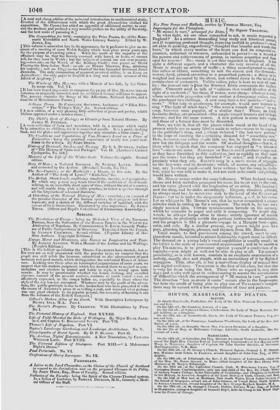MU SIC.'
Six New Songs and Ballads, written by Tnomits Moons, Esq.
B Si or THALBERG.
Impromptu fbr the Pianoforte.
" Mi manca twee," arranged for Ditto. c gn In what light, we are often compelled to ask, is music regarded jp England? As a science demanding long study and laborious purse and if requiring profound thought, repaying tenfold in produce ?—as au' art akin to painting, engendering" thoughts that breathe and words that burn," in which every motion of the heart can find its congenial es. Pression, unlimited in resource, unbounded in power 2—as a recorder the powers and achievements of genius, in various countries and from ages far remote? No; music is not thus regarded in England. It has quite a different aspect, and a character the very reverse of all this
Music is simply- an article of traffic ; thing manufactured to order' like calico or chintz, something to suit the season and the deinand woven, dyed, printed according to a prescribed pattern ; a thing to be weighed and measured by the sheet, and written down to the level of a certain class of customers. Unlike calico, price is here no test of gush ity ; the general rule is Pat the flimsiest fabric commands the hi;.::heit price. ConnErr used to talk of " calicoes that would dissolve at the sight of a wash-tub ;" but these, if rotten, were cheap : whereas a sons,
whose serviceable properties will not outlast a threepenny calico, costs the purchaser two shillings. A new song lasts a few nmuths—" and u, more." What lady or geotientan, tbr example, would now vestitaitraetetiay sing " The light of other days," " She wore a wreath of roses," or any song, however once popular, of a similar date? These, o favourite ditties, are proseribed—like ample- verged bonnets and bishop's sleeves ; and for the same reason. A new pattern is come into vogue, and those of a former date must be discarded.
Now, we take it, that all the pieces which stand at the head of the present article are so many fabrics made to order—wares to be exposed in the publisher's shop, and perhaps ticketed " the last new pattern,"
in the hope of meeting the everlasting demand for " something new." Here, however, our calico simile fails us ; for, in fact, there is nothin9 new but the titlepage and the words. Of musical thoughts—that is, of ideas which bespeak that the composer has engaged in " a labour of love "—there are none. BARNETT or BALFE conld produce songs such as they have furnished to this collection, just as rapidly as they could pen the notes : bat they are furnished " to order," and therefore are precisely what they are. Intains's song is a mere series of arpeggios on the icey-note and its dominant ; whsiehi, of' course, any schoolboy—
nay, any Academy pupil—could have written : but the song is, doubt- less, what he was told to make it, and not such as he could and probably would have written.
Mr. MoottE writes sander the same influence. When Ireland was his theme and Irish melodies prompted his muse, his heart woe in the work, and his verse glowed with the inspiration of an artist. His inspirer Is
now the shop, and he sinks accordingly-. Elegant, classical, graceful, lie always must be ; he never can sink to the level of the BAVIAS and Huts : but he is under the shopueratic influence, g. c. d. in his verses. Let us whisper in Mr. Moottes ear, that he never committed a greater mistake than in setting up for a composer. The truth is, he has not a sinnle musical idea. Certain remiuiseences intrude on his memory,
9
which he commits to paper and calls it composing. To avoid ship- wreck, he always keeps close to shore: utterly ignorant of inivical navigation, he prudently avoids the perilous intricacies of modulation; and his progress is like a pleasure-voyage in a Margate boat—quiet, calm, and safe. By a similar process, any person might pass for a poet, gleaning thoughts, phrases, and rhymes, from Mr. MOORE. Vocal music, to find purchasers among the crowd, mutt be easy: pianoforte music, intended to attract fitshionable regard must be difficult. The demand. on a young lady's vocal capabilities is usually small ; but far loftier is the scale of instrumental acquirement ; and to be unable to play TuALmatu, is to pronounce against yourself a confession of in- capacity—you might as well not be able to play at all. TIIALBERG.8 peculiarity, as is well known, consists in an emphatic enunciation of a melody, usually slow and simple, with an embroidery of it by flights of arpeggios. This, after all, is but a marvellous display of manual force and digital swiftness. TnAmmac is the first of his class, but that class is very fisr from being the first. Those who so regard it, may thank days and. weeks well spent in endeavouring to master the accumulation of difficulties which the arrangement of " Mi manes la voce" presents. The direction " ben mareato il canto" occurs also in the Impromptu; but here the credit of being able to play one of T IIALBERG'S compose tions may be earned with a less expenditure of time and patience.


























 Previous page
Previous page